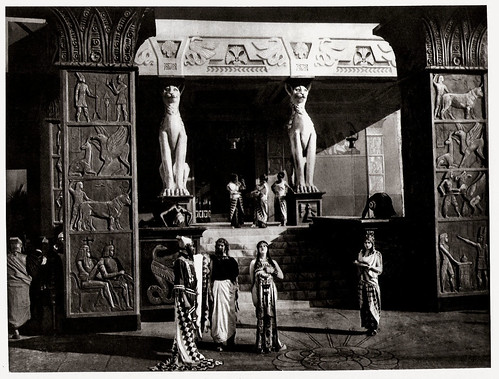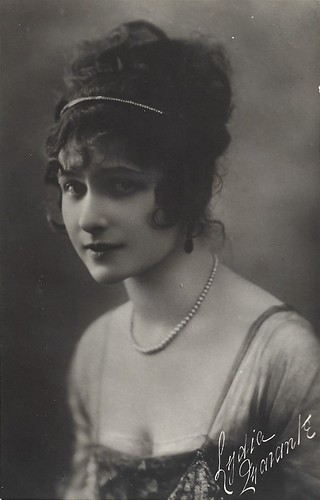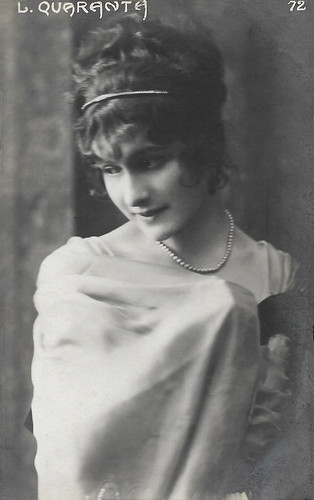
Italian postcard by Ed. A. Traldi, Milano, no. 450.

Publicity still for Cabiria (Giovanni Pastrone, 1914), with Alex Bernard, Edoardo Davesnes, Italia Almirante-Manzini and Lydia Quaranta.

Italian postcard by Fotocelere, Torino.

Italian postcard by Ed. Ballerini & Fratini, Firenze, no. 317. Photo: Massaglia, Torino.
Cabiria
Lydia or Lidia Quaranta was born Lidia Gemma Mattia Quaranta in Turin, Italy in 1891. She started her career as a stage actress at the company of Dante Testa. In 1910 she debuted in the film, together with her sister Letizia Quaranta when the company Itala Film enrolled both. Her true film debut though was in a short called L'ignota/The Unknown Woman (1910), produced by Aquila Films and directed by Edoardo Bencivenga.
After a few more Aquila productions, Quaranta played steadily at Itala, as in the aeroplane drama Come una sorella/Like a Sister (Vincenzo Denizot, 1912), the sensational drama Padre/Father (Dante Testa, Gino Zaccaria, 1912), starring Ermete Zacconi, Lo scomparso/The Dread of Doom (Dante Testa, 1913) with again Zacconi, and the crime story Tigris (Vincenzo Denizot, 1913).
Together with her sister Letizia, she played in Addio giovinezza!/Goodbye youth! (Nino Oxilia, 1913). In 1914 Lydia Quaranta’s cinema career reached its apex when she had the title role in the mega-production Cabiria. This was a historical film made on an epic scale by Giovanni Pastrone who used the pseudonym Piero Fosco.
For a lot of money, the famous author Gabriele D’Annunzio attached his name to the film as the scriptwriter. D’Annunzio in reality only invented some of the names of the characters and helped with the elaborate intertitles of the film.
Hal Erickson reviews at AllMovie: "Cabiria is an Italian historical epic that ran a full 14 reels (well over three hours) at a time when most American films were still short subjects. The plot hinges on the abduction of wealthy and virginal Cabiria (Lidia Quaranta) by pirates during the Roman/Carthaginian War of ancient times. Highlights (many of which were filmed on tinted stock) include the burning of the Roman fleet, an effect accomplished with miniatures and mirrors, and Hannibal's crossing of the Alps - with real Alps, and real elephants."

Spanish collectors card (minicard) by Chocolate Amatller, Barcelona, no. 7 of 12 cards. Photo: Itala Film. Picture from the Italian silent mega-epic Cabiria (Giovanni Pastrone, 1914), starring Italia Almirante Manzini as Sophonisba, Umberto Mozzato as Fulvio Axilla, Lydia Quaranta as Cabiria and Bartolomeo Pagano as Maciste. The high priest Karthalo (Dante Testa) is called by Queen Sophonisba to explain her nightmare. In between them, in the back, we see the adult Cabiria (Lydia Quaranta).

Spanish collectors card (minicard) by Chocolate Amatller, Barcelona, no. 10 of 12 cards. Photo: Itala Film. Picture from the Italian silent mega-epic Cabiria (Giovanni Pastrone, 1914), starring Italia Almirante Manzini as Sophonisba, Umberto Mozzato as Fulvio Axilla, Lydia Quaranta as Cabiria and Bartolomeo Pagano as Maciste. Here Maciste strangles the highpriest Karthalo (Dante Testa), but Cabiria holds him back.

Spanish collectors card (minicard) by Chocolate Amatller, Barcelona, no. 11 of 12 cards. Photo: Itala Film. Picture from the Italian silent mega-epic Cabiria (Giovanni Pastrone, 1914), starring Italia Almirante Manzini as Sophonisba, Umberto Mozzato as Fulvio Axilla, Lydia Quaranta as Cabiria and Bartolomeo Pagano as Maciste. Here we see the death of Sophonisba, surrounded by Cabiria, Fulvio Axilla and the courtiers. She has poisoned herself, rather than become a slave to the Romans.
Struck with Pulmonitis
Cabiria was an international success. Pastrone eventually created a whole series around one of the popular characters of the film, the strong man Maciste (played by Bartolomeo Pagano). Lydia Quaranta did not get this special exposure from Pastrone, but Cabiria did guarantee her many films offers in the years from 1915 to 1920, from various Turinese film companies, such as Gloria and Savoia.
Itala hired her again in 1919, for the then enormous sum of 10.000 lire per month. Among her memorable titles of this period are Iwna, perla del Gange/Iwna, Pearl of the Ganges (Giuseppe Pinto, 1914), Beffa di Satana/Mockery of Satan (Telemaco Ruggeri, 1915) with Dante Cappelli, Il romanzo di un atleta/The novel of an athlete (Vitorio Rossi Pianelli, 1915) with strong man Mario Guaita Ausonia, Nel vortice del peccato/In the vortex of sin (Telemaco Ruggeri, 1916) with Sandro Ruffini, Fiamma!/Flame! (Ettore Piergiovanni, 1920) with director Piergiovanni in the male lead as well, and I tre sentimentali/The three sentimental (Augusto Genina, 1921) - which film historian Vittorio Martinelli considered as her best film.
Hereafter, Quaranta moved to the Fert company, for which she did a few films such as the comedy Treno di piacere/Train of pleasure (Luciano Doria, 1924) with Alex Bernard.
In 1925 she played her last role, a small part in Mario Camerini’s Voglio tradire il mio marito/I want to betray my husband, starring Linda Pini. All in all Lydia Quaranta played in some 70 films.
In 1928, Quaranta was struck by an attack of pneumonia and died in her hometown Turin. She was only 36. Her sister Letizia (1893-1977) had a less intense but longer career. In 1921, she would marry film director Carlo Campogalliani and did various films with him, such as a few starring Maciste. Letizia had a twin sister Isabella (1892-1975) who also knew a career in Italian silent cinema between 1912 and 1917 but didn’t have the status her sisters had.

Italian postcard by Fotocelere, Torino, no. 66.

Italian postcard by Fotocelere, Torino.

Italian postcard by G. Vettori, Bologna, no. 72.

Italian postcard, no. 316. Photo: Massaglia, Torino.
Sources: Hal Erickson (AllMovie), Sandra Brennan (AllMovie), Cinema in Piemonte (Italian - now defunct), Wikipedia (Italian), and IMDb.
No comments:
Post a Comment